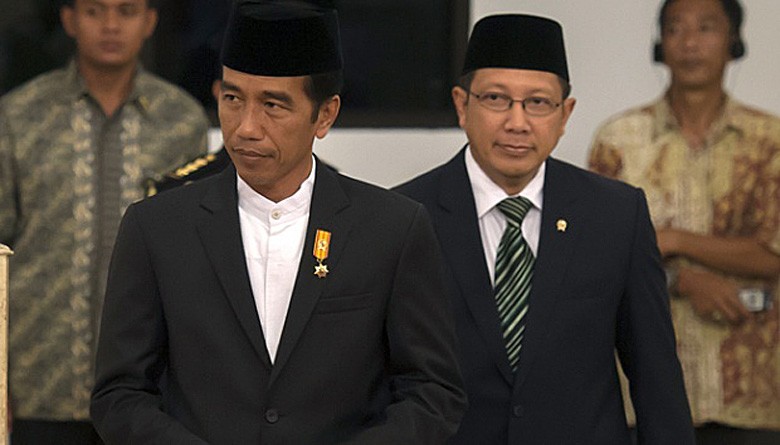Popular Reads
Top Results
Can't find what you're looking for?
View all search resultsPopular Reads
Top Results
Can't find what you're looking for?
View all search resultsReligious Affairs Ministry: White elephant or political necessity?
Historically, the establishment of the Religious Affairs Ministry was a kind of consolation prize for proponents of political Islam in Indonesia. They were disappointed when Sukarno-Hatta, Indonesia’s founding fathers, refused to insert the words “with the obligation to practice sharia” after “Belief in One God”, the first principle of the state ideology Pancasila.
Change text size
Gift Premium Articles
to Anyone
All religions, including Islam, teach us to be honest.
So I was chagrinned when I read in the papers that Suryadharma Ali, former religious affairs minister (October 2009-May 2014 ) had committed corruption. He was found guilty of multiple charges of graft during his time in office. He embezzled haj funds between 2010 and 2013 and misused the ministry’s operational funds between 2011 and 2014 for personal gain.
The religious affairs minister, engaged in corruption? Oh boy, not only does that go against religious values but also against the law. Double disgrace! I was pleased to read that his prison term was increased from six to 10 years. And there’s also the afterlife punishment for him to look forward to.
It’s not the first time a minister of religious affairs was indicted for corruption. In 2006, Said Agil Husin Al Munawar, religious affairs minister ( 2001-2004 ) under president Megawati Soekarnoputri, was sentenced to five years in jail for corruption. He embezzled Rp 35.7 billion (US$2.67 million) of haj funds as well as more than Rp 240 billion of the Ummah Endowment Fund (Dana Abadi Umat) in 2002-2004. Hmmm, not exactly small change, huh?
Well, at least these two ministers are consistent with the reputation of the religious affairs ministry as being one of the most corrupt state institutions. At least in that way they don’t disappoint!
Given this state of affairs, why doesn’t the government abolish the ministry?
The late Abdurrahman “Gus Dur” Wahid, Indonesia’s fourth president, whose brief presidency ( 1999-2001 ) was a shambles and ended in his impeachment, did put out the idea.
One month into his presidency he had closed down two ministries: the Ministry of Social Affairs and the Ministry of Information. But when he mentioned his intention to abolish the Ministry of Religious Affairs, it caused an uproar among traditional Muslims. Indeed it would have been highly ironic, since the ministry is a bastion of Nahdlatul Ulama (NU), the largest Muslim organization in Indonesia, founded by Gus Dur’s grandfather and of which he himself was the head.
Historically, the establishment of the Religious Affairs Ministry was a kind of consolation prize for proponents of political Islam in Indonesia.
They were disappointed when Sukarno-Hatta, Indonesia’s founding fathers, refused to insert the words “with the obligation to practice sharia” after “Belief in One God”, the first principle of the state ideology Pancasila.
The inclusion of these words would have effectively made Indonesia an Islamic state, something our founding fathers did not think was a good idea considering Indonesia’s pluralistic society.
The proposal to establish a ministry of religious affairs was actually struck down twice before it was finally agreed upon. And so, on Jan. 3, 1946, Indonesia’s Ministry of Religious Affairs was born.
It’s a bit of a misnomer. Actually it should be called the Ministry of Islam, as it deals mainly with issues relating to Islam.
Even their logo only has an Islamic symbol, the rehal, an X-shaped foldable wooden book stand on which to rest the Quran.
No sign of the symbols of the other state-recognized religions: Protestantism, Catholicism, Hinduism, Buddhism and Confucianism, let alone widespread traditional beliefs in Indonesia. Hello?
The reasons for Gus Dur to suggest in 1999 to abolish this ministry are the same that prompt many others to do so now. Besides the disgraceful rampant corruption, there’s bureaucratic inefficiency and the ministry’s failure to contribute anything to interfaith peace and to prevent acts of violence against religious minorities.
Why, Suryadharma Ali himself said Ahmadiyah should be banned as heretical when in fact its followers have been part of Indonesia since 1925, 20 years before the country gained independence.
Indonesia constantly falls into the category of countries with appalling religious freedoms. Several international as well as local watchdogs have cited consistent attacks, intimidation and acts of violence, including killings, against religious minorities.
The US Commission on International Religious Freedom, for example, stated that Indonesia’s tradition of pluralism had been strained in recent years by “ongoing sectarian tensions, societal violence and the arrest of individuals considered religiously deviant”.
Attempts to abolish the Religious Affairs Ministry or at least to redefine its function occurred even at the beginning of Joko “Jokowi” Widodo’s presidency. When rumors circulated that the ministry might be abolished, a smear campaign was waged against Jokowi, accusing him of being anti-Islam, of being Chinese (?) and even linking him with certain Christian capitalists and missionaries.
Risibly absurd, but at the same time deadly serious.
One of the success indicators of the Religious Affairs Ministry is the haj pilgrimage. At the same time, it’s also its biggest source of corruption. Surely the solution could be quite simple: to set up a separate, professional body dealing with the technical, logistical and administrative haj matters — something that even a travel agency could do.
In fact last April, Commission VIII of the House of Representatives approved a bill on the implementation of the haj and the umrah, which separates the regulator and the implementer. That’s a good way to cut the corruption in the Ministry!
The other potential source of corruption is Islamic education: building schools, procuring books, etc. You may recall the notorious case of Golkar Party lawmaker Zulkarnaen Djabar, who was sentenced to 15 years in prison in 2013 for corruption involving the procurement of Qurans. Again, Islamic education could be overseen by the Ministry of Education.
So everything points to the dissolution of the Religious Affairs Ministry, right?
Wrong. The historical and political considerations make it well nigh impossible. Especially when one considers that currently the conservative Indonesian Ulema Council (MUI) and the hard-line Islam Defenders Front (FPI) and Hizbuth Thahrir Indonesia (HTI) are slowly overshadowing moderate organizations, such as NU.
NU becomes increasingly important when you consider a project they launched at their muktamar (national conference) in August last year, to promote Islam Nusantara (Islam of the Archipelago) as a counter to the rigid and violent ideology of Islamic State (IS) movement, and locally, FPI and HTI.
So, maybe the Religious Affairs Ministry is not a white elephant after all. It’s a political and security necessity.
***
The writer is the author of Julia’s Jihad.
---------------
We are looking for information, opinions, and in-depth analysis from experts or scholars in a variety of fields. We choose articles based on facts or opinions about general news, as well as quality analysis and commentary about Indonesia or international events. Send your piece to community@jakpost.com.










